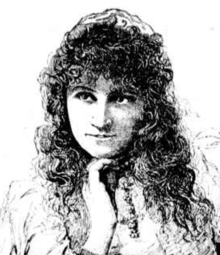Essie Jenyns
Essie Jenyns | |
|---|---|
 | |
| Born | Elizabeth Esther Helen Jennings 5 October 1864 Brisbane, Queensland, Australia |
| Died | 6 August 1920 (aged 55) Killara, Sydney, New South Wales, Australia |
| Nationality | Australian |
| Other names | Mrs J. R. Wood |
| Occupation | actress |
| Years active | 1879–1888 |
| Known for | Shakespearean roles |
Essie Jenyns (5 October 1864 – 6 August 1920) was an Australian actress best known for her Shakespearean roles.
Birth and early life
[edit]Elizabeth Esther Ellen Jennings was born in Brisbane, Queensland in 1864. Her father, Charles Robert Merevale Jennings, was a chemist who died in 1871 when Jenyns was seven. To support the family, her mother, Emily Ann Jennings née Morse, became an actress in W. J. Holloway's company using the stage name "Kate Arden".[1] In 1877 she married Holloway.[2]
Career
[edit]Jenyns began her stage career in Leah, the Forsaken at the Theatre Royal in Hobart in January 1879. Her performance was reviewed as "childlike and natural as little Leah, and gave promise of future success in parts of this description".[3] Next, in After Dark, she "surprised everyone by her natural rendering of Johnny Williams, a 'sidewalk merchant prince'".[4] At age 18 her Ophelia was described in The Bulletin as "a performance full of promise... We shall watch this young lady's career with interest".[5]
In 1884 she went Europe with her mother and step-father where she studied the acting techniques of Sara Bernhardt, Ellen Terry and Mary Anderson. Returning to Sydney in 1886 the Holloway theatre company opened at the Opera House for a 14-week season with Jenyns in the leading roles and playing to capacity audiences. This was followed by a further 16 weeks at the Criterion Theatre and a 14-week season at the Opera House in Melbourne.[6]
Jenyns received acclaim for performances as Juliet in Romeo and Juliet, Viola in Twelfth Night and Portia in The Merchant of Venice and in other Shakespearean roles.[6]
Personal
[edit]
Jenyns married John "Jack" Robert Wood, a wealthy Newcastle brewer[7] and interstate cricketer,[8] at St. Andrew's Cathedral, Sydney on 5 December 1888. The wedding attracted so much attention that tickets were dispensed. However the Cathedral was overrun with press and members of the public and the wedding party had trouble making their way into the church. At the conclusion of the ceremony, a riot broke out and much of the church furniture was damaged or removed as souvenirs and Jenyns was carried out to her carriage in "a fainting condition". She retired from the stage and initially went to live in Jesmond House, Newcastle[9] with her husband, where they were "well known for their many acts of charity ... founding the first free kindergarten in Newcastle".[10] The family moved to London, and by 1908 they had a home, "Collington" in Bexhill-on-Sea, where she had the companionship of a pair of Australian Terriers.[11] They later had a home in Putney.[12] Despite efforts to persuade Jenyns to take up acting again, she declined all offers, with the occasional exception of appearing at performances for charities.[13]
While on a short holiday to Australia, Jenyns died in a private hospital in Killara, NSW on 6 August 1920 after an operation.[14][13] The funeral took place at the Christ Church Cathedral before her burial at Sandgate Cemetery, near Newcastle.[15] She was survived by her husband and two children — Lieut. John Morton Devereux Wood, M.C. and Esther Lyal Wood.[16]
Further reading
[edit]Holloway, David, 1924- (1979), Playing the Empire : the acts of the Holloway Touring Theatre Company / [by] David Holloway, Harrap{{citation}}: CS1 maint: multiple names: authors list (link) CS1 maint: numeric names: authors list (link)
References
[edit]- ^ "Royal Assembly Room". Bathurst Free Press and Mining Journal. New South Wales, Australia. 26 June 1872. p. 2. Retrieved 17 June 2021 – via National Library of Australia.
- ^ Poorten, Helen M. Van Der, "Jennings, Elizabeth Esther Helen (1864–1920)", Australian Dictionary of Biography, National Centre of Biography, Australian National University, retrieved 5 January 2020
- ^ "Theatre Royal". Tribune (Hobart, Tas. : 1876 - 1879). 13 January 1879. p. 3. Retrieved 7 January 2020.
- ^ "Theatre Royal". Tribune (Hobart, Tas. : 1876 - 1879). 5 February 1879. p. 2. Retrieved 7 January 2020.
- ^ "The Bulletin, Vol. 11 No. 143 (21 Oct 1882)". nla.gov.au. Retrieved 7 January 2020.
- ^ a b "Stories of the Theatre". Arrow (Sydney, NSW : 1916 - 1933). 21 December 1917. p. 3. Retrieved 7 January 2020.
- ^ "Theatrical Gossip". Melbourne Punch (Vic. : 1855 - 1900). 6 December 1888. p. 10. Retrieved 29 August 2020.
- ^ "Celebrated Australian Theatrical Family". The Mail (Adelaide). Vol. 3, no. 116. South Australia. 18 July 1914. p. 8. Retrieved 9 July 2021 – via National Library of Australia.
- ^ "Small Historic Church". Dungog Chronicle : Durham and Gloucester Advertiser (NSW : 1894 - 1954). 26 June 1936. p. 6. Retrieved 29 August 2020.
- ^ "Mr J. R. Wood Dead". Newcastle Sun (NSW : 1918 - 1954). 17 February 1928. p. 5. Retrieved 29 August 2020.
- ^ ""Essie Jenyns" at Home". The Queenslander. No. 2232. Queensland, Australia. 19 December 1908. p. 29. Retrieved 16 June 2021 – via National Library of Australia.
- ^ "Essie Jenyns". The Sydney Morning Herald. No. 25, 769. New South Wales, Australia. 7 August 1920. p. 14. Retrieved 18 June 2021 – via National Library of Australia.
- ^ a b "Essie Jenyns Dead". Daily Telegraph (Sydney, NSW : 1883 - 1930). 7 August 1920. p. 10. Retrieved 29 August 2020.
- ^ "In the Theatres". The Sun (Sydney, NSW : 1910 - 1954). 29 August 1926. p. 32. Retrieved 29 August 2020.
- ^ "Late Mrs. J. R. Wood". Sydney Morning Herald. 9 August 1920. Retrieved 5 January 2020.
- ^ "Crowd Damaged Church Furniture". The Daily Telegraph (Sydney). 4 July 1928. Retrieved 5 January 2020 – via Trove.
